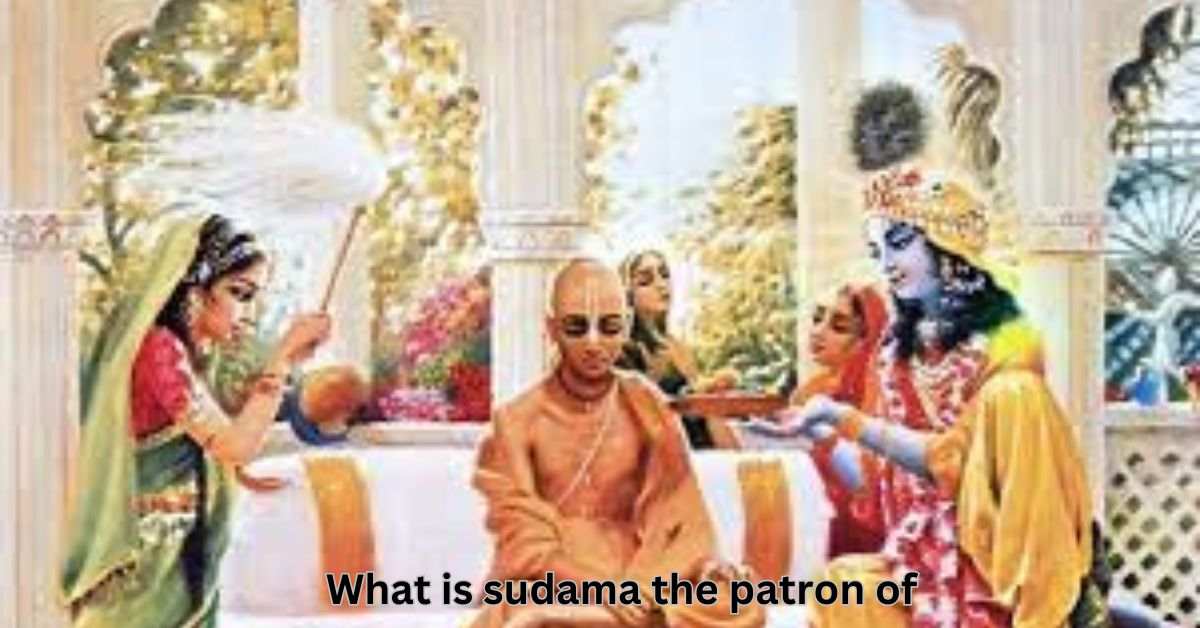GENERAL
Sudama: The Patron of Humility and Devotion

Sudama: The Patron of Humility and Devotion
In Hindu mythology, there are countless stories that exemplify virtues such as courage, strength, and wisdom. However, there are also stories that speak to the deeper, more subtle qualities that are equally important for spiritual growth. One such figure who embodies humility, devotion, and unwavering faith is Sudama. Known as the humble friend of Lord Krishna, Sudama’s life and legacy offer powerful lessons for modern-day seekers of peace, wisdom, and spiritual connection.
Introduction to Sudama
Sudama, often referred to as “Krishna’s poor Brahmin friend,” is a well-known figure in the Hindu epic, the Bhagavata Purana. He was a simple Brahmin who lived a life devoted to Lord Krishna, despite his poverty and humble circumstances. The story of Sudama and Krishna is not just a tale of friendship; it is an inspiring narrative that emphasizes the importance of devotion, the power of humility, and the supreme grace of God.
The Humble Life of Sudama
Sudama was born into a poor Brahmin family. Unlike the wealthy and powerful kings and warriors often celebrated in Hindu epics, Sudama led a life of simplicity and austerity. He was content with whatever little he had, and his devotion to Lord Krishna was his greatest wealth. His life, although devoid of material riches, was filled with spiritual wealth.
Sudama’s story is significant because it reminds us that humility and devotion are far more valuable than material wealth or status. While many people seek fame, fortune, and power, Sudama’s life teaches us that true happiness and peace come from within, through the cultivation of virtues like humility, patience, and steadfast faith in God.
The Friendship Between Sudama and Krishna
The bond between Sudama and Krishna is one of the most touching friendships in Hindu mythology. Sudama and Krishna had known each other since childhood. They both studied under the same teacher, Sandipani, in the city of Avantika. Despite their different backgrounds—Krishna being a prince and Sudama coming from a poor family—they formed a deep and lasting friendship based on mutual respect and love.
After their schooling, Krishna became a king, and Sudama continued his life as a poor Brahmin. However, their bond remained unbroken. Sudama’s devotion to Krishna was unparalleled, and Krishna’s affection for Sudama was equally strong. In their friendship, Krishna exemplifies the qualities of compassion and grace, while Sudama represents the highest form of devotion and humility.
Sudama’s Journey to Dwaraka
The most famous story involving Sudama and Krishna takes place when Sudama, in dire need of assistance, decides to visit Krishna in Dwaraka. Despite his poverty, Sudama’s heart was filled with love and devotion towards Krishna, and he had no desire to ask for anything material. He set out on the journey to Dwaraka, not expecting anything in return but simply hoping to see his beloved friend.
Sudama’s poverty was so severe that he had no money to offer Krishna. Instead, his wife gave him a handful of beaten rice (poha) as a gift for Krishna. Sudama, filled with humility, set out for Dwaraka, with only the small offering in hand.
Krishna’s Divine Grace
When Sudama arrived at the grand palace of Krishna, he was overwhelmed by the opulence and magnificence of the surroundings. However, his mind remained focused on his beloved Lord. Despite his humble appearance, Krishna immediately recognized his old friend and greeted him with great warmth and affection.
Krishna washed Sudama’s feet, a gesture that symbolizes the supreme honor and respect Krishna had for his friend. He welcomed Sudama into the palace and made him feel like an honored guest. Sudama, however, was hesitant to even offer the small gift of beaten rice, feeling unworthy of Krishna’s attention.
But Krishna, with his divine grace, took the gift and immediately ate it. Krishna’s act of accepting the humble offering of beaten rice is seen as a powerful symbol of his love for his devotees, regardless of their social or economic status. Krishna’s acceptance of Sudama’s gift shows that it is the devotion and purity of heart, not the material value, that matters in the divine relationship between God and devotee.
Sudama’s Transformation
After the exchange between Krishna and Sudama, Sudama returned to his village. But the transformation that occurred in his life was nothing short of miraculous. Upon his return, Sudama found that his small hut had been transformed into a grand mansion, filled with riches. His family, once impoverished, was now living in prosperity.
This miraculous turn of events is a reflection of Krishna’s divine blessings. Sudama’s sincere devotion and humility had moved Krishna to shower him with divine grace. The story of Sudama teaches us that the path to spiritual abundance is through selfless devotion and humility, not through seeking material gains.
Lessons from Sudama’s Story
Sudama’s story offers profound lessons that resonate even today. Here are some key takeaways:
1. The Power of Humility
Sudama as a patron of humility and devotion life demonstrates that true greatness lies in humility. Despite his poverty, he never sought riches or fame. His focus was solely on his devotion to Krishna. Humility allows us to transcend the ego and connect with the divine on a deeper level.
2. Devotion Above All
Sudama’s unwavering devotion to Krishna, despite his dire circumstances, is an example for all devotees. True devotion is not dependent on material circumstances. It comes from the heart and is the purest form of love for the divine.
3. Divine Grace is Unconditional
Sudama’s life shows that divine grace is not limited to the rich or powerful. Krishna, the Supreme Being, showered his blessings on Sudama not because of his wealth or status but because of his pure heart and devotion. The message is clear: God’s grace is available to all who approach Him with love and devotion, irrespective of their material condition.
4. Selflessness Over Materialism
Sudama as a patron of humility and devotion story urges us to let go of the pursuit of material wealth and to focus on cultivating inner virtues like kindness, humility, and selflessness. True fulfillment comes not from external possessions, but from the richness of the soul.
5. Friendship with God
The relationship between Sudama and Krishna exemplifies the idea that God is not distant or unreachable. Krishna’s immediate recognition of Sudama, and his actions to honor and bless him, show that God is always present for those who sincerely seek His companionship.
Conclusion: Sudama as the Patron of Humility and Devotion
Sudama’s life is a beacon of humility, selfless devotion, and divine grace. His story transcends time and continues to inspire countless individuals to lead a life of humility, faith, and devotion to the divine. As the patron of humility and devotion, Sudama teaches us that true wealth is not found in material possessions, but in the purity of our hearts and the depth of our connection to the divine. Through his story, we are reminded that even in the most challenging times, faith and humility can lead us to the ultimate spiritual fulfillment.
By embracing the qualities that Sudama personifies—humility, devotion, and trust in divine grace—we can cultivate a life of peace, joy, and spiritual abundance. Sudama’s legacy serves as a timeless reminder that, in the end, it is our inner virtues, not outer riches, that define our true worth.
GENERAL
Effective Drainage Installation: A Comprehensive Guide

Proper drainage installation is essential for safeguarding your property against costly water damage and maintaining a stable foundation. Without a reliable system, excess water can lead to erosion, basement flooding, or landscape deterioration. Whether you’re a homeowner tackling a DIY project or a professional searching for best practices, understanding the right approach makes all the difference. For specialized local expertise, consider consulting professionals in drainage installation MA, who bring valuable regional experience to residential and commercial installations. This guide provides a thorough overview, including types of drainage systems, step-by-step installation, common pitfalls, and practical maintenance tips to ensure your investment stands the test of time.
Planning and Preparation
Success starts with a clear plan tailored to your property’s unique landscape. Begin by assessing your site during and after rainfall to locate trouble spots—areas with persistent puddles, basement leaks, or visibly eroded soil. Analyze the topography: Is your land flat, sloped, or dotted with natural low points? Understanding how water naturally moves across your property helps you map where intervention is most needed.
Soil composition plays a major role in drainage efficacy. Sandy soils ensure faster water movement, while clay-heavy areas have poor absorption and a tendency to retain water. Adjust your drainage design according to your findings, considering the proximity of structures, landscaping, and property boundaries.
Choosing the Right Drainage System
Popular Drainage Options
- French Drains: These subsurface systems use perforated piping encased in gravel, which is ideal for redirecting groundwater away from homes and landscaping features susceptible to saturation.
- Channel Drains: Surface-level solutions designed to intercept and route runoff from driveways, patios, or pool decks. Channel drains are especially effective in paved areas that collect rainwater quickly.
- Swales: Shallow, grass-lined ditches or depressions shaped to encourage the slow movement of water across lawns or gardens, protecting against large-scale flooding and promoting groundwater recharge.
Selection depends on site conditions and your drainage goals. For example, if you routinely deal with surface water, a combination of swales and channel drains may be effective, while properties with persistent groundwater issues often benefit from French drains. Additionally, always factor in your regional climate; frequent heavy rains may require more robust drainage capacity.

Materials and Tools Required
Preparation saves time and ensures your installation runs smoothly. Commonly used materials include:
- Drainage pipes: Choices like perforated PVC or corrugated plastic provide durability and flexibility to suit various layouts.
- Gravel: Used for pipe bedding and increased drainage efficiency.
- Filter fabric: Prevents soil from entering and clogging the pipe, maintaining system performance.
- Concrete: Occasionally needed for anchoring or creating catch basins, especially in channel drain systems.
Key tools include a sturdy shovel, level, hand saw for pipe adjustments, wheelbarrow for hauling, and essential safety gear like gloves and eye protection. A trenching tool or mini-excavator may be helpful for larger projects.
Step-by-Step Installation Guide
- Excavation: Using your predetermined routing, dig a trench along the drainage path, maintaining a slope of at least 1% (minimum 1 inch drop per 8 feet) to guarantee consistent water movement away from problem areas.
- Foundation Preparation: Spread a 2–3 inch base layer of gravel in the trench. This layer cushions the pipe and helps discourage soil movement beneath it.
- Pipe Installation: Lay the drainage pipe on top of the gravel, verifying the slope with a level. Position pipe holes (if using perforated pipe) facing downward or to the side.
- Covering the Pipe: Pour additional gravel around and above the pipe until it is covered by at least 2–3 inches. Wrap the entire gravel layer in filter fabric to stop soil intrusion and eventual clogging.
- Backfilling: Fill the remaining trench with topsoil, compacting gently as you go. Avoid heavy packing, as excessive compaction can damage pipes or disrupt the drainage gradient.
Common Mistakes to Avoid
- Insufficient Slope: Even a minimal slope is critical for allowing water to flow out of the system. Flat trenches can result in pooling and undermine the entire project.
- Poor Maintenance: Over time, leaves, roots, and debris can block pipes and inlets. Neglecting regular clearing can cause backups, leading to unexpected flooding.
- Ignoring Soil Composition: Installing a one-size-fits-all system can be a costly mistake. For instance, heavy clay soils might necessitate larger or more frequent outlets and broader gravel beds.
Maintenance and Inspection
Sustaining Peak Performance
- Debris Removal: Check inlets, gutters, and outlet points frequently, especially after storms, to ensure obstructions do not inhibit water flow.
- Inspection: Walk your system at least twice a year and after significant rainfall. Look for signs of slow drainage, water backing up, or soft spots on the surface.
- Professional Assessment: For complex or older systems, an annual review by a drainage professional can identify early-stage problems—such as root intrusions, crushed pipes, or system undermining—before they become expensive repairs.
Reliable drainage preserves both foundational integrity and the aesthetic appeal of your landscaping. By investing in careful planning, smart system selection, and ongoing upkeep, you can avoid water problems and boost your property’s value for years to come.
GENERAL
Secure Your Spot: Trump Rally Tickets Now Available

Secure Your Spot The excitement is building as Trump rally tickets now become available, offering supporters the opportunity to attend one of the most talked-about political events of the season. These rallies, known for their energetic crowds and passionate speeches, serve as a key platform for former President Donald Trump to connect directly with his base. Whether you’re a longtime follower or newly interested in political gatherings, securing your ticket early ensures you won’t miss out on this dynamic experience.
The Significance of Trump Rallies in Modern Politics Secure Your Spot
Political rallies have long been a cornerstone of American democracy, providing candidates with a chance to energize supporters and communicate their message directly. Trump rallies stand out for their high energy, large attendance, and media coverage. These events often become a focal point for discussions on policy, campaign strategies, and grassroots mobilization.
Trump’s approach to rallies combines charismatic oratory with a strong emphasis on patriotism, economic plans, and national security, which resonates deeply with his core supporters. Attending these gatherings is not only about witnessing a political event but also becoming part of a collective movement.
How to Secure Trump Rally Tickets: Tips and Insights Secure Your Spot
Obtaining tickets for a Trump rally requires a bit of strategy. While many rallies are free to attend, tickets are often required to manage crowd size and security measures.
Some rallies also offer VIP experiences or meet-and-greet opportunities, which may come with additional perks but require advanced planning.
Understanding the Ticket Distribution Process Secure Your Spot
The ticket distribution system for Trump rallies is designed to ensure an orderly and safe event. Interested attendees typically sign up through official platforms where they provide contact details and confirm attendance. These systems may operate on a first-come, first-served basis or use a lottery method to allocate tickets fairly.
In recent years, the campaign has incorporated digital ticketing, allowing supporters to receive e-tickets via email or mobile apps, streamlining entry procedures and reducing paper waste. Security screening is standard at rally venues, so attendees should prepare for checkpoints similar to those at large public events.
The Experience of Attending a Trump Rally
Attending a Trump rally is more than just listening to speeches; it’s a vibrant social event. Supporters often arrive hours early to join in pre-rally festivities, including live music, merchandise booths, and community gatherings. The atmosphere is charged with enthusiasm, featuring chants, flags, and coordinated displays of support.
Speeches typically cover current political issues, upcoming elections, and policy proposals, delivered with the former president’s signature style. Media presence is strong, capturing moments that often trend on social platforms. For many attendees, the rally offers a sense of belonging and an opportunity to engage with fellow supporters.
COVID-19 Considerations and Safety Protocols
In light of ongoing health concerns, many rallies now incorporate safety measures to protect attendees. These can include optional mask policies, social distancing guidelines, and hand sanitation stations. Organizers work closely with local authorities to comply with regulations and ensure the well-being of participants.
Some rallies might limit capacity or offer virtual participation options for those unable to attend in person.
Frequently Asked Questions About Trump Rally Tickets
Q1: Are Trump rally tickets free or paid?
Most Trump rally tickets are free, distributed to manage attendance and security. However, some special access packages or VIP experiences may require payment.
Q2: How can I get tickets for upcoming Trump rallies?
Tickets are typically available through the official campaign website or affiliated political groups. Signing up early is crucial due to high demand.
Q3: Can I get tickets at the door on the day of the rally?
Generally, tickets must be obtained in advance to enter. However, some venues may offer limited standby entry based on availability.
Q4: What identification or documents are needed at rally entry?
Attendees usually need their ticket (printed or digital) and a valid photo ID to enter the venue.
Q5: Are there any age restrictions for attending Trump rallies?
Age restrictions vary by venue and local laws, but many rallies welcome attendees of all ages, often with parental supervision for minors.
Conclusion
Securing your spot at a Trump rally is an opportunity to participate directly in a vibrant and impactful political tradition. With tickets now available, early action is key to ensure access to these high-energy events. Stay informed, prepare accordingly, and get ready to join thousands of supporters in celebration of a dynamic political movement.
GENERAL
Battle-Ready Threads: The Ultimate Army Shirt

Battle-Ready Threads When it comes to military apparel, the army shirt stands out as a versatile and essential piece of gear that combines functionality with durability. Known for its rugged construction and tactical design, this garment is not only a symbol of discipline and strength but also a practical choice for those seeking reliability in harsh environments. From soldiers on the battlefield to outdoor enthusiasts and fashion aficionados, the ultimate army shirt has become a staple, blending advanced fabric technology with time-tested design features.
The Evolution of Military Shirts: From Battlefield to Everyday Wear Battle-Ready Threads
The history of army shirts traces back to early military uniforms where comfort and practicality were paramount. Modern army shirts have evolved significantly, embracing innovation in materials like ripstop cotton and moisture-wicking polyester blends. These fabrics ensure breathability and resilience, which are critical for combat situations and physically demanding tasks.
Today’s military-grade shirts often feature reinforced stitching, adjustable cuffs, and strategically placed pockets, designed to meet the rigorous demands of soldiers. These details, originally intended for tactical advantage, have influenced civilian outdoor clothing, making the army shirt a popular choice for hiking, camping, and other adventure sports.
Tactical Features That Define the Ultimate Army Shirt
What makes the ultimate army shirt stand out in the realm of tactical apparel? It’s a combination of thoughtful design and performance-driven features. For instance, many army shirts are engineered with ventilation panels under the arms or on the back, enhancing airflow to keep the wearer cool during intense activity. Additionally, the use of flame-resistant materials and antimicrobial treatments provide added safety and hygiene, which are crucial in combat zones.
The shirt’s fit also plays a vital role. A balance between mobility and protection allows soldiers to maneuver freely while maintaining coverage. Features like reinforced elbows and padded sections contribute to durability without sacrificing comfort. These design choices exemplify how military apparel integrates technology and ergonomics to create battle-ready threads.
The Role of Camouflage Patterns in Military Shirts Battle-Ready Threads
One cannot discuss army shirts without mentioning the iconic camouflage patterns that serve both functional and symbolic purposes. Camouflage is designed to blend soldiers into their environments, reducing visibility to adversaries. The evolution from traditional woodland and desert patterns to modern digital and multicam designs reflects advances in concealment technology.
Moreover, camouflage has transcended its military origins to become a fashion statement. Streetwear brands and outdoor gear manufacturers often incorporate these patterns to evoke a rugged, tactical aesthetic. This crossover between utility and style highlights the enduring influence of military apparel on contemporary clothing trends.
Material Science Behind High-Performance Army Shirts
Advances in material science have revolutionized army shirts, making them lighter, stronger, and more comfortable. Innovations like moisture-wicking fabrics draw sweat away from the skin, keeping soldiers dry and reducing the risk of chafing during prolonged wear. Breathable mesh panels enhance ventilation, while UV-resistant treatments protect against sun damage during outdoor missions.
Durability remains a top priority, with fabrics engineered to resist tears, abrasions, and stains. The integration of stretch fibers allows the shirt to move with the wearer, providing flexibility without compromising structural integrity. Such materials are essential in harsh environments where clothing must perform under extreme conditions.
Versatility Beyond the Battlefield: Civilian Uses of Army Shirts
While originally designed for combat, army shirts have found diverse applications in civilian life. Outdoor enthusiasts appreciate their ruggedness for hiking, fishing, and camping, where durable and weather-resistant clothing is necessary. Hunters rely on camouflage patterns for concealment, while construction workers and first responders benefit from the functional pockets and reinforced design.
Fashion trends have embraced military-inspired apparel, with the army shirt serving as a canvas for streetwear innovation. Its utilitarian appeal pairs well with jeans, boots, and accessories, creating a look that is both practical and stylish. This versatility cements the army shirt’s place beyond military use, making it a wardrobe essential for many.
Caring for Your Army Shirt: Maintenance Tips for Longevity
To maintain the performance and appearance of an army shirt, proper care is essential. Most military shirts come with specific washing instructions to preserve fabric treatments like water resistance and flame retardancy. It’s advisable to use mild detergents, avoid bleach, and wash in cold water to prevent damage.
Drying methods also impact fabric longevity; air drying is preferable, though some shirts can be tumble dried on low heat. Regular inspection for wear and tear allows timely repairs, ensuring the garment remains functional. By following these guidelines, users can extend the life of their battle-ready threads.
FAQs about the Ultimate Army Shirt
Q1: What materials are commonly used in army shirts?
Army shirts are typically made from a blend of ripstop cotton and synthetic fibers like polyester or nylon. These materials offer durability, breathability, and moisture-wicking properties suited for demanding environments.
Q2: How do camouflage patterns differ between army shirts?
Camouflage patterns vary based on terrain and mission needs. Common types include woodland, desert, digital, and multicam, each designed to provide optimal concealment in specific environments.
Q3: Can army shirts be used for outdoor activities?
Absolutely. Their durable construction, moisture management, and tactical features make army shirts ideal for hiking, camping, hunting, and other outdoor pursuits.
Q4: Are all army shirts flame-resistant?
Not all, but many military shirts incorporate flame-resistant materials or treatments to enhance safety in combat zones. Civilian versions may or may not include these features.
Q5: How should I care for my army shirt?
Follow the manufacturer’s instructions, typically involving gentle washing with mild detergents, avoiding bleach, washing in cold water, and air drying or low heat tumble drying to preserve fabric integrity.
Conclusion
The ultimate army shirt embodies a perfect blend of functionality, durability, and style. Designed initially to meet the rigorous demands of military service, these shirts have evolved with technological advancements to offer superior performance in diverse environments. Whether used on the battlefield or as rugged everyday wear, battle-ready threads continue to set the standard for tactical apparel. Their enduring appeal lies not only in their practical features and innovative fabrics but also in their ability to inspire confidence and resilience wherever they are worn.
-

 ENTERTAINMENT5 months ago
ENTERTAINMENT5 months agoUnveiling the Mystery of Kashito_Toto: A Digital Frontier
-

 GENERAL5 months ago
GENERAL5 months agoClassroom6x: Revolutionizing the Future of Learning
-

 TECHNOLOGY5 months ago
TECHNOLOGY5 months agoUnlocking the Power of SSIS 816: A New Era in Data Integration
-

 TECHNOLOGY5 months ago
TECHNOLOGY5 months agoUnlocking the Mystery of Vy6ys: A Hidden Gem
-

 ENTERTAINMENT5 months ago
ENTERTAINMENT5 months agoSoapperTV: The Next Evolution in Streaming Entertainment
-

 GENERAL5 months ago
GENERAL5 months agoUnraveling Time: What Hour Was It 8 Hours Ago?
-

 GENERAL5 months ago
GENERAL5 months agoQuid Pro Quo Harassment: What It Is and Why It Matters
-

 HEALTH5 months ago
HEALTH5 months agowhat is the strongest natural antibiotic for tooth infection


